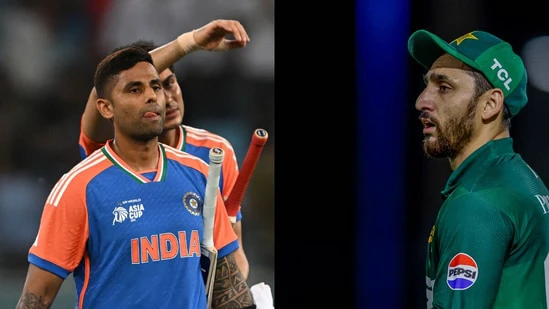The foreboding shadow of Pahalgam is impossible to ignore. The grisly tragedy that claimed 26 innocent lives on April 22 will linger in our memories long beyond the foreseeable future.
Operation Sindoor, the armed forces’ retaliatory strikes, will stand as testimony to India’s unwillingness to take terror lying down. Viewed against all this, a game of cricket seems insignificant, miniscule, even crassly insensitive in the opinion of numerous hundreds of thousands.
Understandably, therefore, the build-up to India’s clash against Pakistan on Sunday in the T20 Asia Cup has been diffused, uneasily tense and respectfully mindful of public sentiment back home. In normal course, cricket would have taken centre-stage but this course is anything but normal, therefore the Group A match at the Dubai International Cricket Stadium will be less about cricket and more about everything else that has transpired in the last four and a half months.
Players and members of the Indian support staff find themselves in a delicate position. They take their orders from the bosses, which is the Board of Control for Cricket in India. The BCCI, like all other national sports bodies, take their cue from the government of India. A recent policy decision by the sports ministry has emphatically banned bilateral matches against Pakistan in any discipline anywhere in the world. It has also greenlit participation in multi-nation events where Pakistan is also involved, because boycotting an Asian Games or the Olympics, or refusing to play Pakistan in this Asia Cup, for instance, will attract heavy penalties.
Furthermore, India have made a pitch to host the Commonwealth Games in 2030 and are desirous of staging the 2036 Olympic Games, and any act contrary to the practices of international sports bodies will not help their cause. “It is relevant to take into account India’s emergence as a credible venue to host international sports events,” the sports ministry statement said, inter alia. “Accordingly, Indian teams and individual players will take part in international events that also have teams or players from Pakistan.”
There is discontent, if not anger and outrage beyond motivated forces, in India with regard to playing Pakistan on Sunday. If anyone was in any doubt about whether the players were aware of it, those were laid to rest on Saturday by Ryan ten Doeschate, India’s assistant coach who walked a tricky tightrope with admirable dexterity. “It’s a very sensitive issue and I’ve got no doubt the players share the compassion and feeling of the vast majority of the Indian public,” the former Dutch international said, choosing his words carefully. “The Asia Cup was in a limbo for a long period of time, we didn’t think we were going to be coming (to the tournament) at one stage. Obviously, you know what the Indian government’s stance in it is.
“The players have to put those sentiments and the emotions behind, that’s something we addressed in the team meeting today. We’re aware of people’s feelings; at the same time, we’ve got to go out, and the guys get a chance to play for their country. They’ll be as professional and focused as they can be given the circumstances. Hopefully, the way we play can represent how players feel about the country.”
Every move under the microscope
Historically, whenever India have played Pakistan, the craving for success is overwhelming. There is added weight of expectations now, some invoking national pride to demand victory. For still-young men caught in the crossfire, it’s a huge cross to bear but there is no shying away from the fact that they will be under the microscope, their every action and gesture and smile and shrug dissected minutely and through a prism of heavy disapproval. As if playing cricket on such a vast stage isn’t challenging enough.
Asked in May if India should continue to play Pakistan in multi-team tournaments, head coach Gautam Gambhir had said, “My personal answer to this is absolutely no. Till all this (terrorism) doesn’t stop, there should not be anything between India and Pakistan.” Now, the former India opener and ex-MP has undertaken the task of trying to keep the players’ focus on the task ahead. “Gauti’s message has been very professional, about not worrying about things that are not in our control and being emotionless when approaching the cricket side of things,” ten Doeschate revealed. “Individuals have different levels of feeling on the spectrum of where they feel the whole situation is, but the messaging has been to focus on the cricket.”
Easier said than done, maybe, but once they take the field, the need to give the best account of themselves will take precedence over everything else. At one level, hard as it might be to comprehend, the players will even forget who their opponents are. They will stretch every sinew to extend their T20I record against Pakistan to 11-3 but if that doesn’t materialise, it won’t be for lack of effort, commitment, hunger or fervour.
